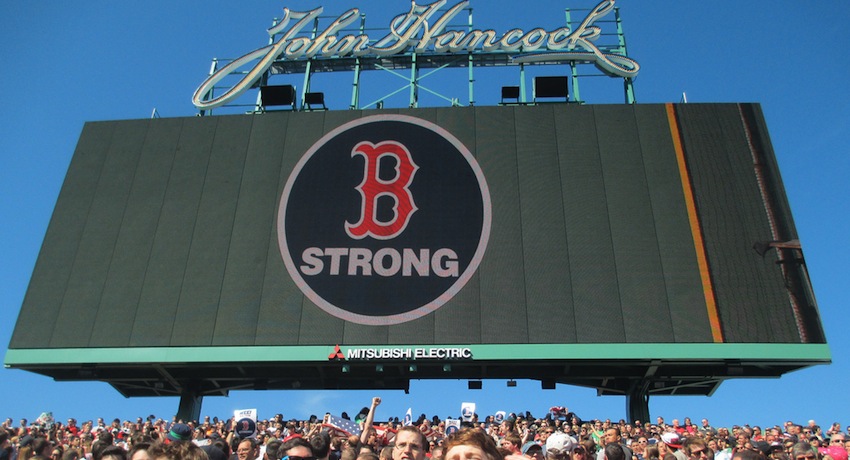The Beginning of a ‘Boston Strong’ Branding Backlash
As the Boston Marathon attacks recede into the past, people seem to be growing a bit braver about expressing their concern with the way the phrase “Boston Strong” has transitioned from expression of solidarity to marketing tool. The Globe‘s editorial board, without expressing a strong opinion, nonetheless described the shifting implications of “Boston Strong” well this morning:
In the weeks since the Boston Marathon bombings, the “Boston Strong” slogan, once a spontaneous expression of defiance and civic pride, has evolved into something of a brand, applied to charitable ventures, available on T-shirts sold at drugstores, wielded on Twitter and at sporting events.
The Globe was reacting to a viral picture of a Toronto Maple Leaf’s fan wielding a “Toronto Stronger” sign at a recent game that prompted some widespread rage on social media. A Boston Reddit post on the same Toronto fan revealed some distaste not just with the “Toronto Stronger” guy, but with “Boston Strong” itself. “As much as I hate the gross commercialization that’s become of Boston Strong, I want to kick this guy in the head,” wrote one Reddit user. He received 146 “upvotes” from approving readers. “[Boston Strong is] supposedly to remember and persevere through tragedy, but people are just out to make money off of it,” agreed one user in reply. “Completely agree, boston strong banner outside of the wendy’s in downtown x’ing? c’mon…” added another.
Boston-based New Yorker writer Ian Crouch more cautiously put forward some of the same concerns Reddit users had with the commercialized use of “Boston Strong” in a blog post Wednesday. “[I]n the month since the bombing, there has been an alignment of charity, marketing, and commerce—which mostly serves laudable and important ends, but nonetheless is complex and, at times, disconcerting,” Crouch wrote.
He seems to suggest (and we’d add) that profiting off of “Boston Strong” isn’t necessarily bad—many of the organizations putting the logo at the end of their commercials have donated generously to the fund. And businesses were hurt by the attacks too, so if they receive a boost from shoppers who want to reward businesses for expressing civic pride, who is to stop them? Businesses get some exposure. The One Fund gets donations. No one’s losing, right? One question Crouch raises though, is whether the One Fund is best served by these kinds of “spend your money with us and part if it will go to victims” structure.
“If clever shirts, and other sleek retail items, motivate people who might not normally give money to donate to the victims, then they have served a noble purpose and achieved practical results,” Crouch writes. “Yet there is a more efficient act of giving, which would be to send the money directly to the One Fund itself, skipping the middle production costs—as well as avoiding a chance for cashing in by the unscrupulous.” It’s probably impossible to tell whether people give less to the One Fund in the end because they think their #BostonStrong Yankee Candle purchase satisfies their need to give, or whether the Yankee Candle spurs more donations than the fund would have otherwise received. But as April 15, 2013, gets farther away, expect to see a bit more open debate about it.



